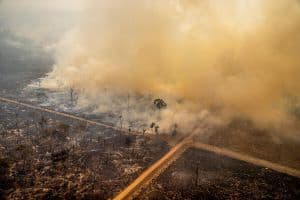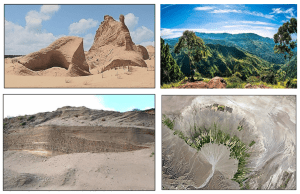The most impact on an ecosystem is caused by unnatural occurrences. These occurrences include human activity like urbanization, deforestation, and pollution.

Unnatural occurrences can affect all living things in an ecosystem along with the non living environment. Living things, such as fish, are dependent upon water. The quality of water is affected by human-made activities which result in water pollution.
Due to unnatural occurrences, certain species are endangered or have gone extinct. Some of the recently extinct species include:
- Ivory-Billed Woodpecker.
- Splendid Poison Frog.
- Lake Lanao Freshwater Fish
Table of Contents
- Environmental differences within ecosystems are generally caused by
- How can our lack of ecological knowledge harm us
- How do changes in one part of an ecosystem affect all its populations?
- Identify two ways in which industrial development has affected ecosystems
- Which of the following statements best describes how endemic diseases impact a population?
- Which type of pollution is believed to have the most impact on an ecosystem?
Environmental differences within ecosystems are generally caused by
Environmental differences within ecosystems are generally caused by abiotic factors which can change due to human activity.

Abiotic factors are nonliving factors present in an environment. Examples include:
- Fire
- Water
- Air
- Ice
- Temperature
- Rocks and minerals
Many animals form complex societies of related individuals and are dependent upon biotic and abiotic factors. Biotic factors include all living things, and they interact with abiotic factors. They also need to be able to tolerate the abiotic factors.
Changing abiotic factors, due to human activity, can affect an organism’s way of life in so many ways. For example, an organism needs to tolerate the temperature within an ecosystem.
Temperatures exceeding the maximum tolerable temperature of an organism can severely affect the metabolic activity of an organism.
Organisms can change and adapt to their environment, but adaptation to the environment by a population does not include changes made in the environment due to human activity.
How can our lack of ecological knowledge harm us
Our lack of ecological knowledge can harm us in so many ways. Not only can it affect the lives of animals and plants, but human beings as well.
Having ecological knowledge can help us take preventive measures before it’s too late for us to even breathe. For example, knowledge about the importance of plants, and how they can reduce carbon dioxide and release oxygen can help us create awareness to plant more trees.
Having knowledge of the ecosystem can help us better understand the importance of living things and their interactions with human life. It can also help us reduce the number of endangered species living in different types of habitats that are soon going to be extinct due to human activity.
It is important for us to protect our ecosystem. Not only the existing ecosystems need protection but also any new ecosystem discovered around the world.
Generally, it takes many years before we might even notice a change in our environment. The reason is that these changes are slow and take many years before we can realize the damage we have done to our ecosystem.
How do changes in one part of an ecosystem affect all its populations?
Changes in one part of an ecosystem can affect all its populations due to the interactions between different species of different levels.

Earth’s landscape and all of its life is known as the biosphere. It contains a variety of organisms that interact with each other within different ecosystems.
Species interact with each other on different levels. For example, a species can be a producer or a consumer. Interaction between species can create a healthy ecosystem and makes it easier for the species to survive and evolve.
Any decrease in the population of a producer can result in a decrease in the population of consumers. It can damage biodiversity and change the entire ecosystem.
Identify two ways in which industrial development has affected ecosystems
The two ways in which industrial development has affected the ecosystem are pollution and urbanization.
Pollution
Pollution is a harmful effect of rapid industrialization. It has caused significant damage to different environments around the world by producing chemical wastes, pesticides, radioactive materials, etc.
It affects all environments on earth that support life and disrupts natural habitats. Animals in an ecosystem are decreasing in population, and habitats are being destroyed due to pollution.
Urbanization
Urbanization is a process where people move from rural/agricultural areas to concentrated industrialized cities.
Industrialization needs people to work in factories that have generated uncontrolled pollutants over the years and continues to do so.
Urbanization has long been associated with human development and progress. But recent studies have shown that urban settings can also lead to significant changes in ecosystems.
Which of the following statements best describes how endemic diseases impact a population?
The statement that best describes how endemic diseases impact a population is that an endemic disease can result in decreasing population numbers in a particular location.
An endemic disease is a disease that remains permanently in a certain geographical region. For example, malaria is considered an endemic disease in many countries due to its consistent occurrence in those countries.
Pandemic diseases, such as COVID-19, are epidemic diseases that have originated from a particular region and have spread throughout the world.
Which type of pollution is believed to have the most impact on an ecosystem?
The type of pollution which is believed to have the most impact on an ecosystem is chemical spills.

Pollution is a phenomenon that disturbs the natural composition of the environments on earth that support life such as air, water, and soil affecting the plants and animals in an ecosystem.
A chemical spill is a pollutant that consists of hazardous chemicals being added up by factories, water transportation, agricultural irrigation, pesticide, or herbicides to soil affecting the lands and air.
At the top level of the food chain, harmful substances accumulate the chemical spill which causes loss of biodiversity affecting all living organisms that inhabit an environment.
The impact of pollution depends on the location of ecosystem. If the ecosystem is located far away from the human population, the impact is lowered but not eliminated as pollutants can reach these environments in various ways.